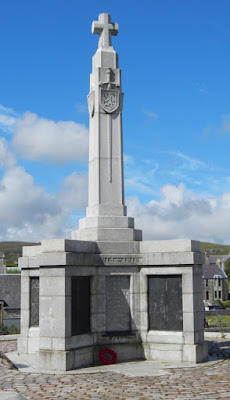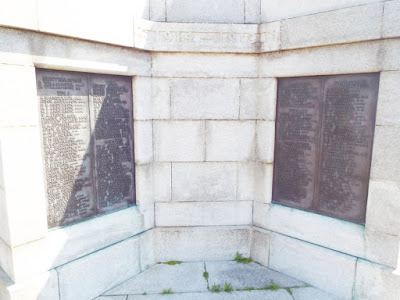The Shetland Islands War Memorial is situated just across the road from Lerwick Town Hall. It comprises a tall cross on a cross-shaped plinth.
Each of the sides of the plinth has a pair of cast plates which bear the names of the dead of the First World War, listed in alphabetical order under the name of the Shetland parish they came from.
The Memorial is flanked by two later stone walls, each of which has a pair of cast plates bearing the names of the dead of the Second World War from each parish.
In front of the memorial is an inscribed paving slab in memory of Lieutenant William Bruce VC.
It is interesting to note that Lieutenant Bruce was not a Shetlander (he was born in Edinburgh), but his father – Lieutenant Colonel Andrew Murison Macrae Bruce of the 4th Punjab Infantry – was a younger son of William Arthur Bruce of Symbister, Shetland. The Bruce family was one of the so-called County Families of Shetland.
William Arthur McCrae Bruce was born on 15th June 1890 in Edinburgh. He was educated at Victoria College, Jersey, and then at the Royal Military College, Sandhurst. After he had passed out and gained a commission, he joined 59th Scinde Rifles (Frontier Force).
The regiment served on the Western Front in 1914–15, and it was during the Battle of Givenchy that Lieutenant Bruce won his Victoria Cross.
The citation was included in the London Gazette on 4th September 1919, and states:
Each of the sides of the plinth has a pair of cast plates which bear the names of the dead of the First World War, listed in alphabetical order under the name of the Shetland parish they came from.
The Memorial is flanked by two later stone walls, each of which has a pair of cast plates bearing the names of the dead of the Second World War from each parish.
In front of the memorial is an inscribed paving slab in memory of Lieutenant William Bruce VC.
It is interesting to note that Lieutenant Bruce was not a Shetlander (he was born in Edinburgh), but his father – Lieutenant Colonel Andrew Murison Macrae Bruce of the 4th Punjab Infantry – was a younger son of William Arthur Bruce of Symbister, Shetland. The Bruce family was one of the so-called County Families of Shetland.
William Arthur McCrae Bruce was born on 15th June 1890 in Edinburgh. He was educated at Victoria College, Jersey, and then at the Royal Military College, Sandhurst. After he had passed out and gained a commission, he joined 59th Scinde Rifles (Frontier Force).
The regiment served on the Western Front in 1914–15, and it was during the Battle of Givenchy that Lieutenant Bruce won his Victoria Cross.
The citation was included in the London Gazette on 4th September 1919, and states:
The late Lieutenant William Arthur McCrae Bruce, 59th Scinde Rifles (Frontier Force), Indian Army.The Victoria Cross was presented to Bruce's mother by the Lieutenant Governor of Jersey, Major General Sir Alexander Wilson, on 13th March 1920. One of the Houses of Victoria College, Jersey, bears his name, and ex-pupils of the College bought the VC when it came up for sale in 1992. They presented the medal to the school, and it is currently on loan to the Jersey Museum.
For most conspicuous bravery and devotion to duty. On the 19th December, 1914, near Givenchy, during a night attack, Lieutenant Bruce was in command of a small party which captured one of the enemy's trenches. In spite of being severely wounded in the neck, he walked up and down the trench, encouraging his men to hold on against several counter-attacks for some hours until killed. The fire from rifles and bombs was very heavy all day, and it was due to the skillful disposition made, and the example and encouragement shown by Lieutenant Bruce that his men were able to hold out until dusk, when the trench was finally captured by the enemy.


































.jpeg)








Interesting Bob.
ReplyDeleteI always understood that WW1 memorials listed names in order of military seniority whereas WW2 memorials were alphabetic.
There will have been different standards applied depending on whether it was the local council, or the church or a local 'grandee' who paid for the memorial.
I read a book on interpreting war memorials, a long time ago, I will try and track it down.
Jim Duncan,
DeleteI must admit that I have never noticed local War Memorials that did not list the names other than in alphabetical order. Perhaps - as you write - it depended upon who was paying for the memorial.
All the best,
Bob
You'll have me looking more closely at every memorial I come across now. I *think* all of the ones I've seen here in Oz are alphabetical, though, WW1 or otherwise.
DeleteKaptain Kobold,
DeleteIt would not surprise me to hear that the names on Australian war memorials are in alphabetical order and not in order of rank.
All the best,
Bob
I wish I had known you were in Shetland. You could have come to the club for a game. Two of my wives family are remembered on the memorial. They weren't in the forces but were killed when they found a sea mine on the beach.
ReplyDeleteMikey,
DeleteIt would have been great to meet you, but we were only in Lerwick from early morning until late afternoon. That is one of the problems of going everywhere by cruise ship; you are never in one place for very long!
My wife and I visit lots of war memorials during our travels, and I must admit that the Shetland one had far more names on it than we would have expected from such a small population.
All the best,
Bob